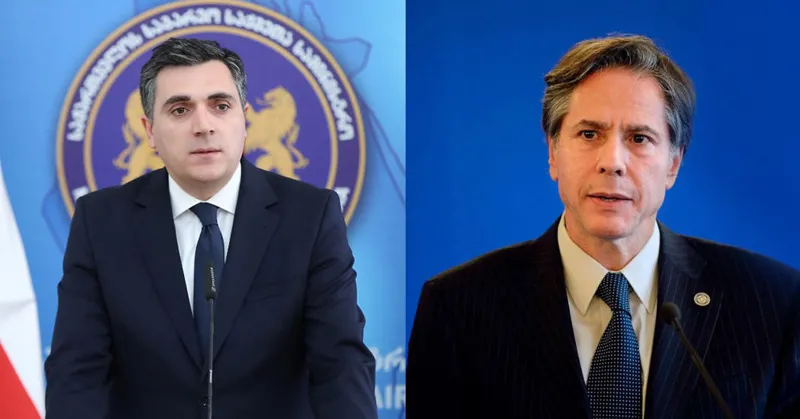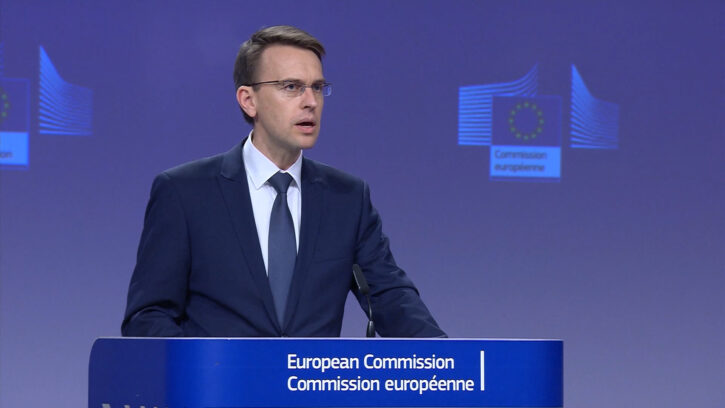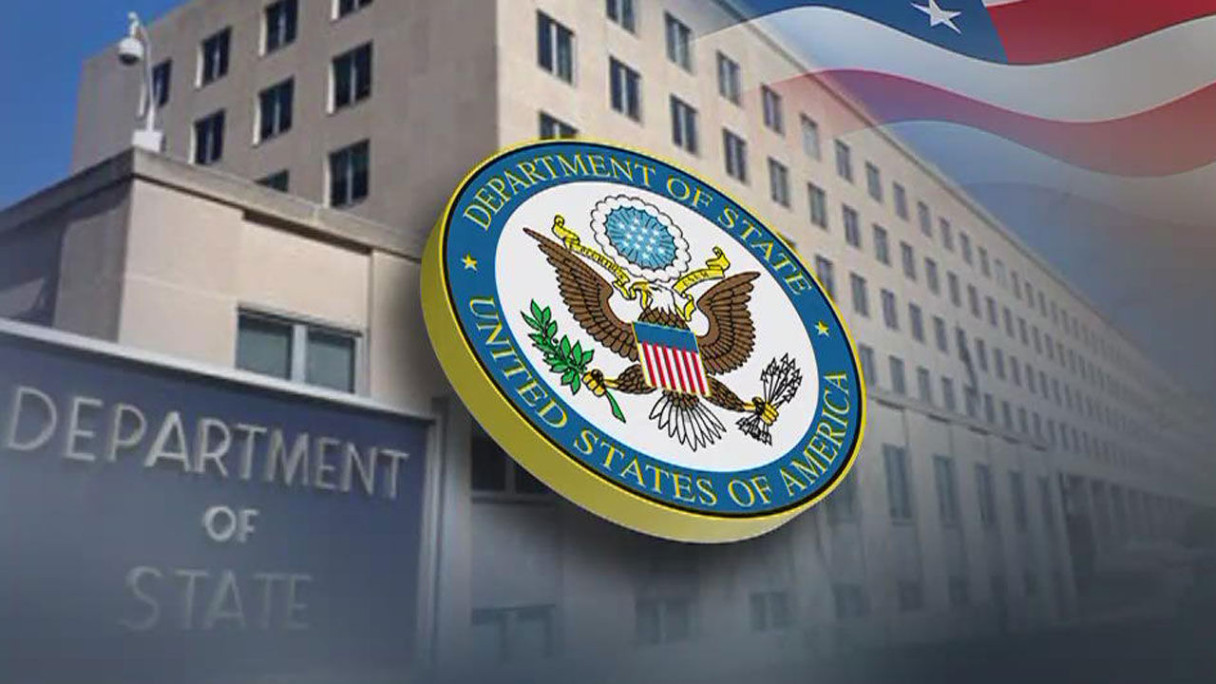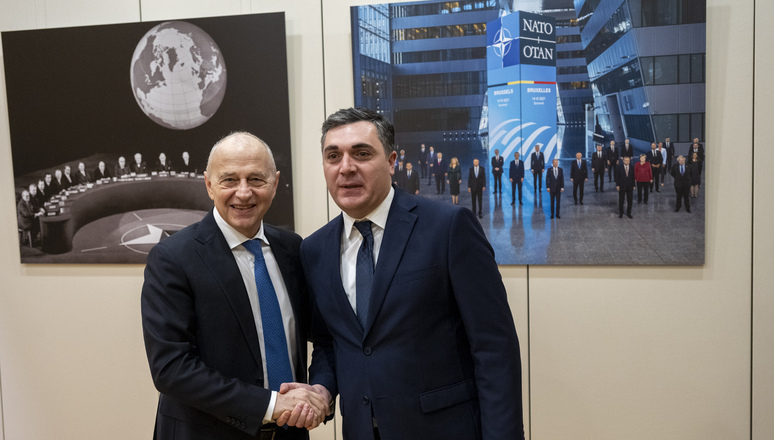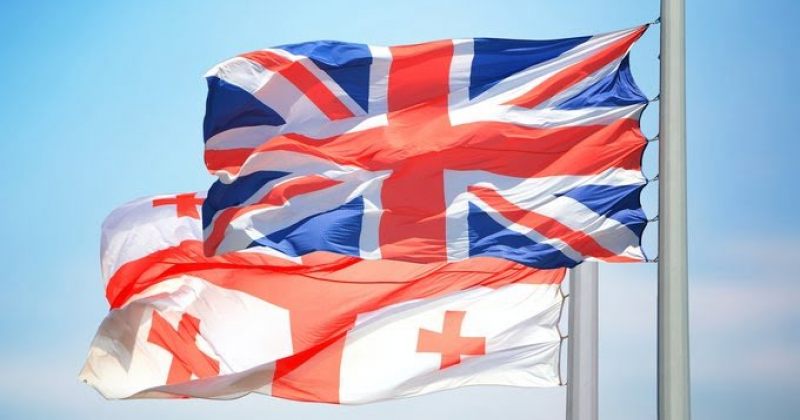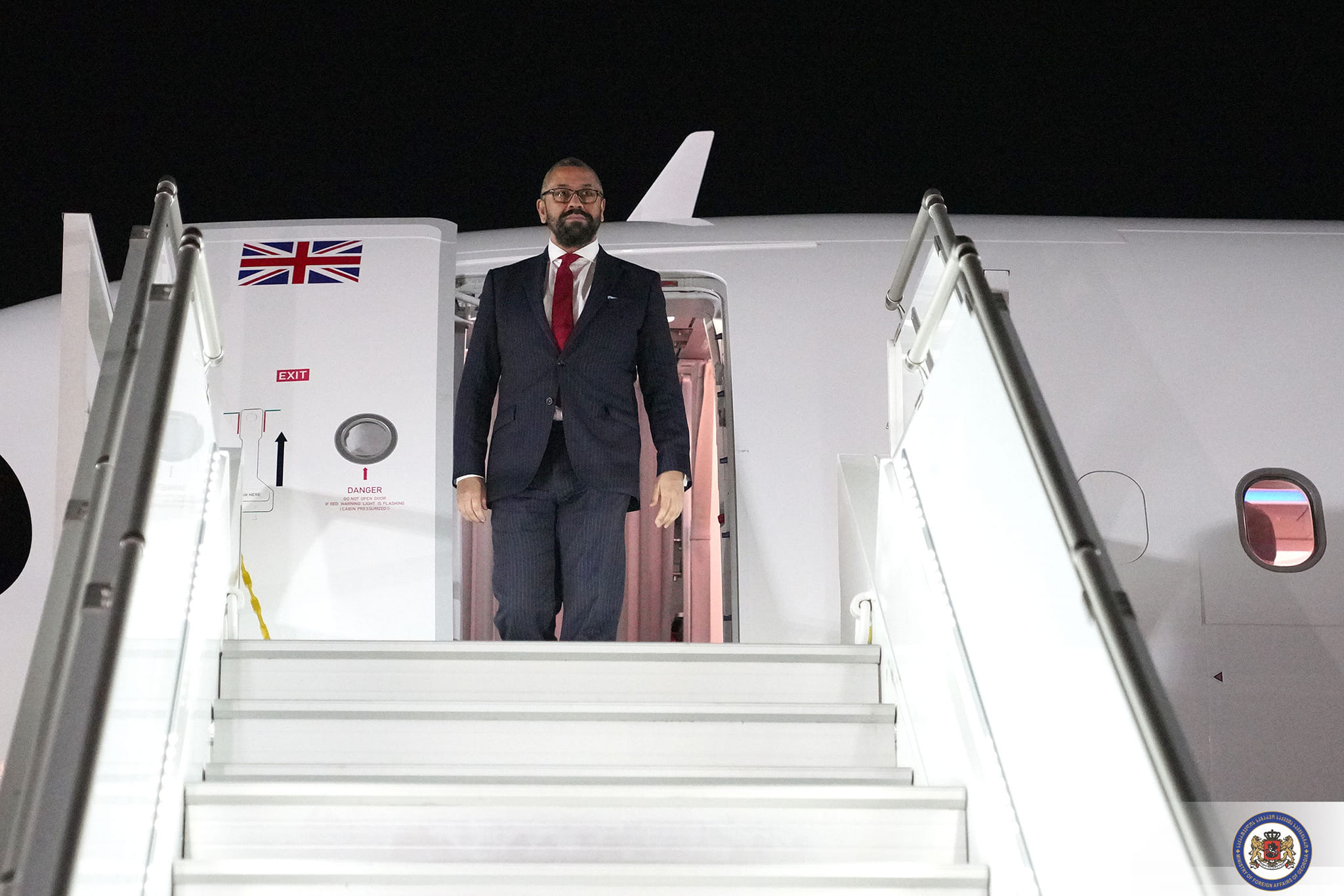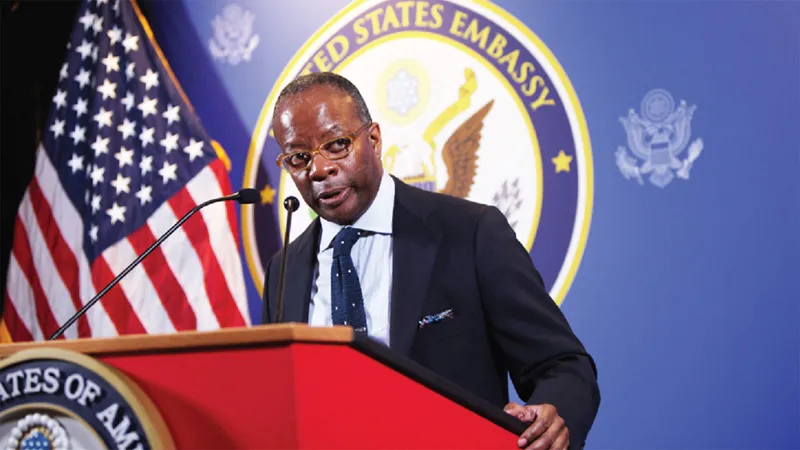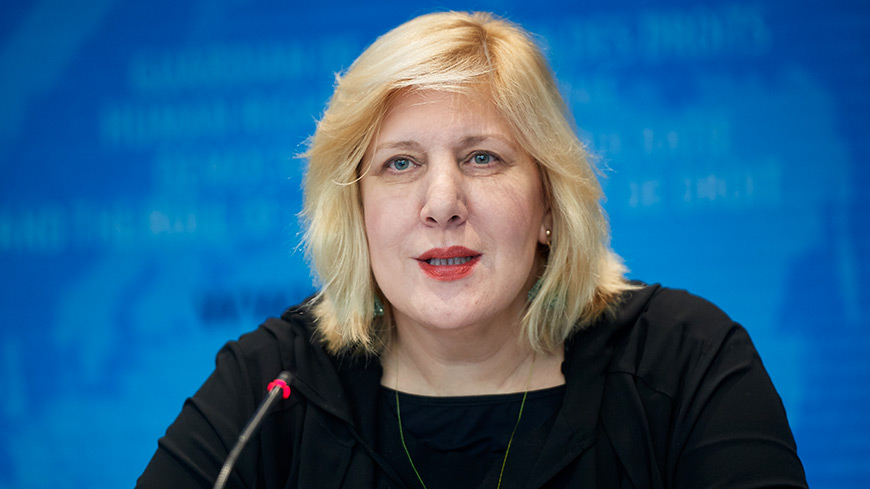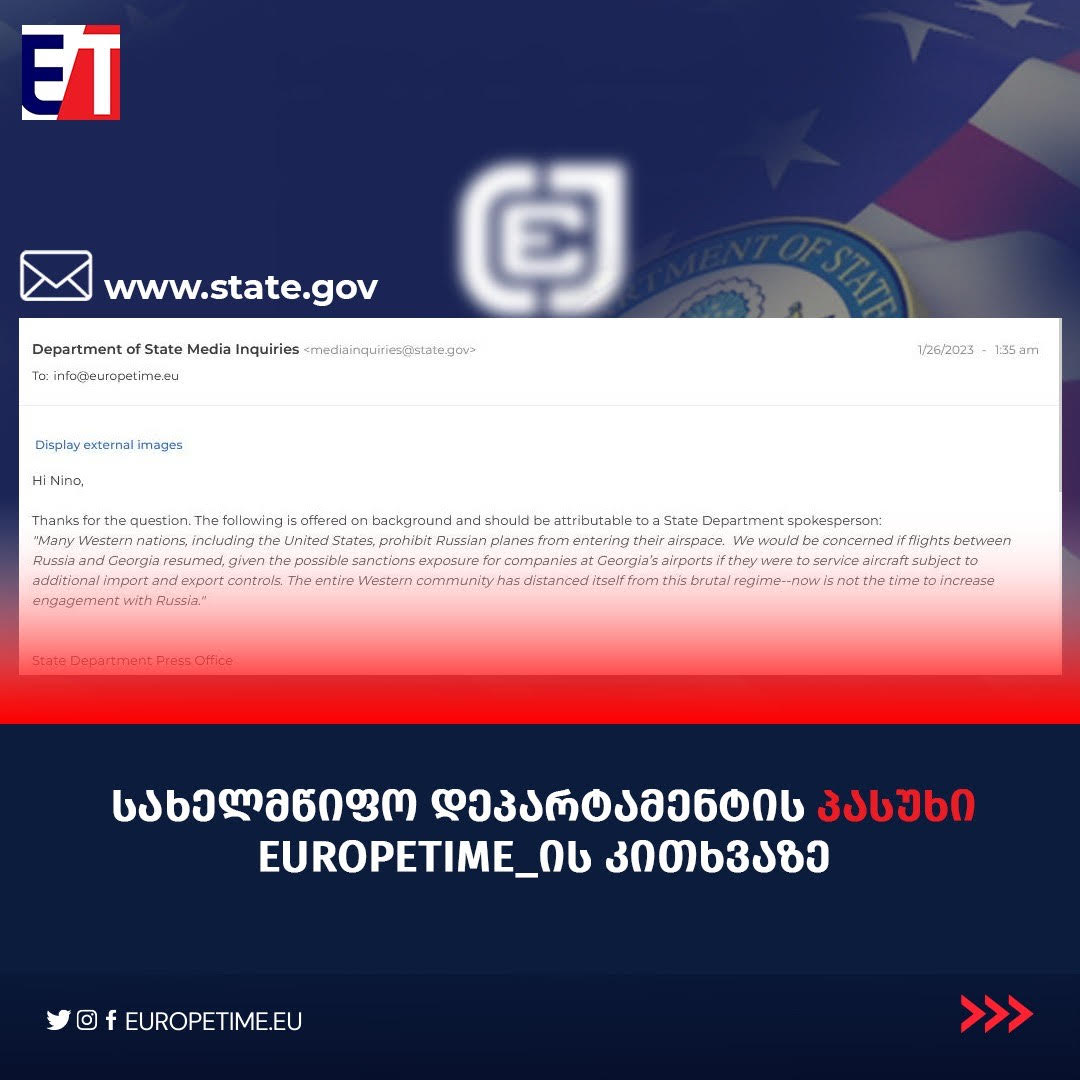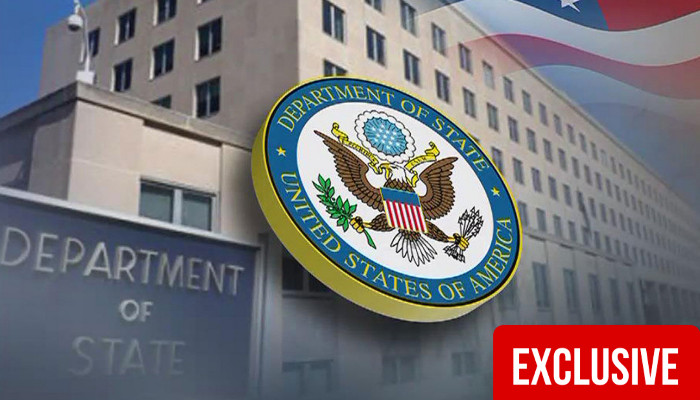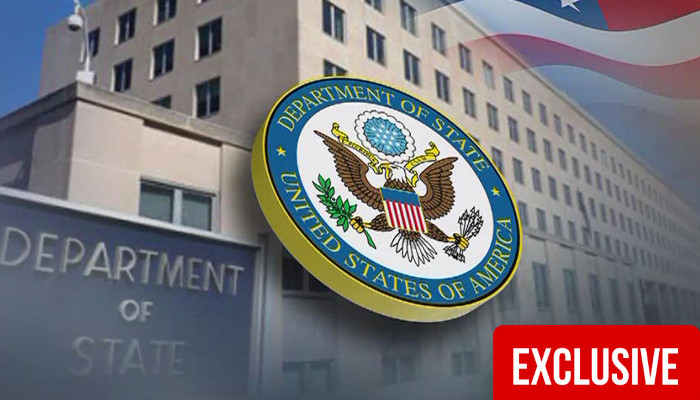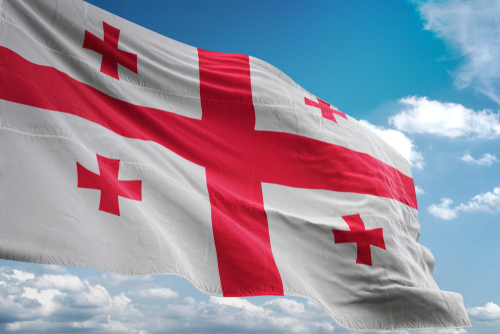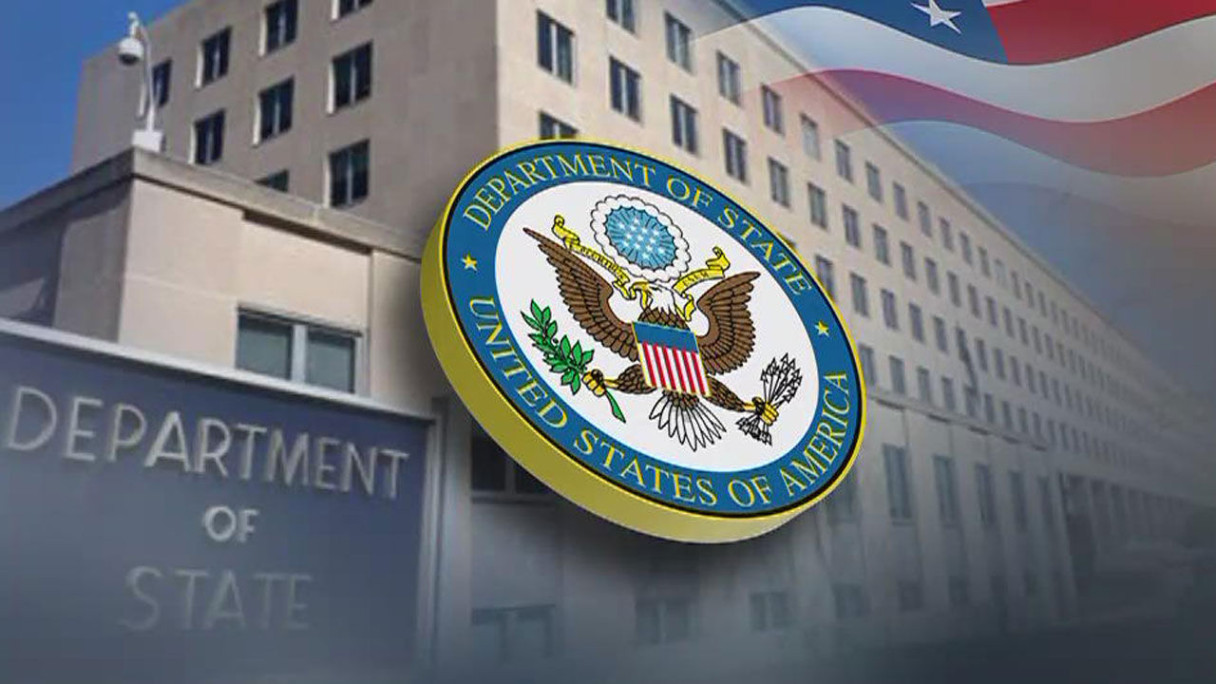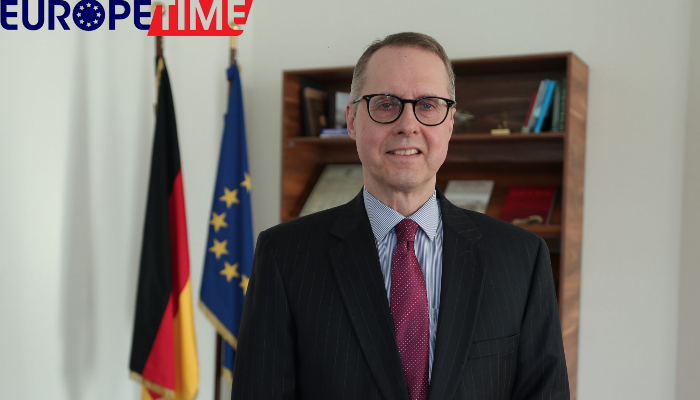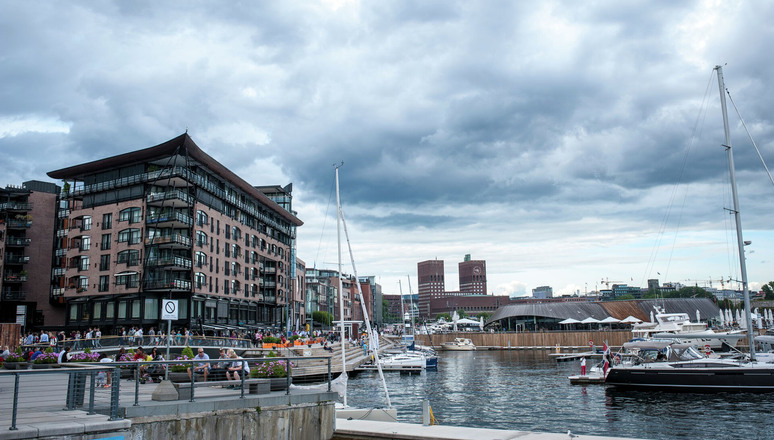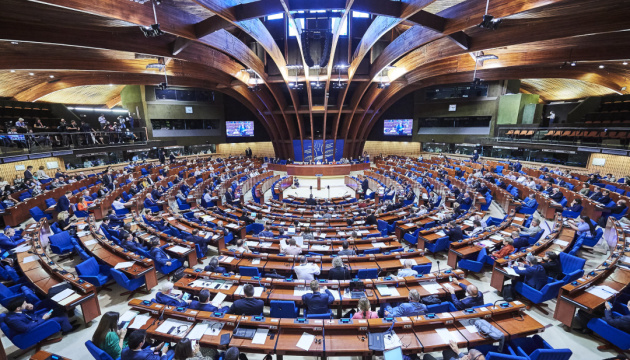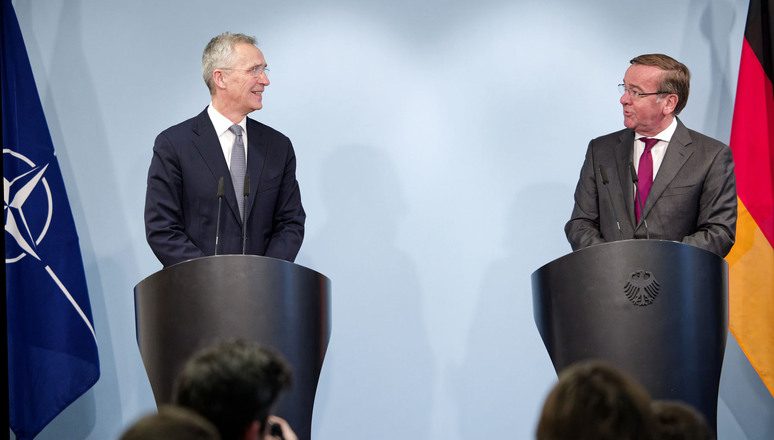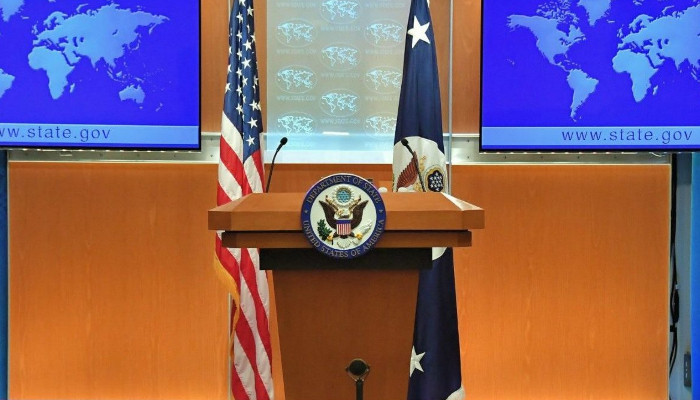news
FM Ilia Darchiashvili addresses Antony Blinken with a letter
The Minister of Foreign Affairs, Ilia Darchiashvili, addresses the United States Secretary of State Antony Blinken with a letter. Ilia Darchiashvili points out, that the decision of the US State Department on sanctioning judges, which was made public without presenting any evidence, is completely incomprehensible and unacceptable. "On behalf of the Georgian people and the Government of Georgia, we confirm our deep respect and commitment to the strategic partnership between Georgia and the United States of America. As we learned, the US State Department made a decision regarding the sanctioning of three active and one former judge of the independent Georgian judicial system. First of all, I would like to remind you of the most difficult legacy that Georgian Dream had to face in the judicial system in 2012, when it came to power. The reality was the worst: the court was turned into a division of the prosecutor's office and another link in the repressive machine of the authoritarian regime, the rate of guilty verdicts exceeded 99 percent, 300,000 citizens were tried, elite corruption included both the court and other areas, the government committed systemic crimes. Under the conditions of an unjust and repressive judicial system, the number of prisoners reached 25 thousand in prisons, where the systematic practice of torture and inhuman treatment of prisoners was introduced. As a result, the death rate of prisoners was unprecedentedly high. After Georgian Dream came to power, the number of prisoners decreased by 2.5 times, and the death rate decreased by 10 times. In addition, after Georgian Dream came to power, the rate of pre-trial detention by the courts decreased three times, the rate of administrative detention decreased three times, the rate of approval of requests for investigative actions was halved, the rate of bail decreased twenty times, the rate of fines decreased five times, etc. Under the conditions of the previous government and its judicial system, the Georgian people could not find justice in Georgia and were forced to turn to the European Court of Human Rights. In 2004-2012, 5416 complaints of Georgian citizens were submitted to the Strasbourg court. For comparison, in 2013-2022, this figure was only 1132. In 2009-2012, the European Court considered about 4,000 complaints filed against Georgia. According to the data of 2023, only 147 complaints filed against Georgia are considered in the Strasbourg Court, which is the best indicator of Georgia during its membership in the Council of Europe. It should be noted that during the period of the previous government, the main creators and architects of the court's criminal system - Mikheil Saakashvili and Zurab Adeishvili were not sanctioned by any country, and moreover, unfortunately, they enjoyed specific guarantees of inviolability or still enjoy it. The sharp decrease in appeals in the Strasbourg court, as well as the above statistics, is a clear proof that the systemic problems in the judicial system have been eliminated after 2012, which is the result of the relevant political will and the four waves of fundamental judicial reform carried out by the Georgian Dream government. Citizens of Georgia can effectively protect their rights within the country today. The justice system has become effective and today it provides an effective opportunity to protect rights. The government has repeatedly appealed to critics of Georgia's current judicial system to present specific court cases that, in their opinion, were decided unfairly. However, critics have so far failed to present any such case. A clear example of the bias of critics of the judicial system is the decision of the Strasbourg court regarding the case of "Rustavi 2" TV station. The decision proves that, on the contrary, pressure was exerted on the court by Nika Gvaramia, the general director of "Rustavi 2" at that time. In the decision, it is mentioned that "groundless media attacks made by the General Director of Rustavi 2" against the judge of the case can be considered as an inappropriate attempt to influence the judge's decision, and the said attacks, in general, can contribute to undermining the authority of the judiciary." We would like to remind you that representatives of opposition parties and non-governmental organizations, media outlets owned by the opposition, former president, former public defender, as well as individual representatives of the diplomatic corps were actively involved in the attempt to damage the reputation of the court in connection with the "Rustavi 2" case. The Georgian court is perceived by the population and international studies as one of the most advanced. According to the "IPSOS FRANCE" survey ("Assessment of Judicial Reforms in Georgia"), 55% of the population of Georgia think that the court is fair, 52% think that the court is reliable and 51% think that the court is independent. As a result of the government's ten-year work and reforms, Georgia ranks high in international rankings. In the 2022 index of the rule of law of the "World Justice Project", Georgia ranks first in the region of Eastern Europe and Central Asia. According to the Corruption Perceptions Index of 2022, Georgia is the leader in the Eastern Europe and Central Asia region, for the first time in the history of the index, it is in the top 20 in Europe and ahead of 11 EU member states. At the same time, work on judicial reform continues with the Venice Commission to further strengthen the independence and transparency of the judiciary and to make the legislation even more complete. Therefore, taking into account this reality, the decision of the US State Department to sanction judges, which was made public without presenting any evidence, is completely incomprehensible and unacceptable. We hope that the State Department will provide relevant evidence or reconsider its decision. Otherwise, the state of Georgia and the Georgian people perceive this as pressure on the independent court of the sovereign state and gross interference in its activities, which will damage the long-term friendly relations between Georgia and the USA," the Minister wrote.
EEAS Spokesperson on US Sanctions against four Georgian Judges
Peter Stano, the spokesperson for the external affairs of the European Union, said on Thursday that the European Union has its own legislative framework for adopting sanctions that are always discussed and agreed upon by all 27 member states of the EU in consensus. „There is currently no EU sanctions regime in place for Georgia, and no sanctions decisions have been made related to the people mentioned below in the US sanctions" he told Europetime. „There is currently no EU sanctions regime in place for Georgia, and no sanctions decisions have been made related to the people mentioned below in the US sanctions. As a general rule, we do not comment on sanctions decisions by others, the EU has its own legislative framework for adopting sanctions that are always discussed and agreed upon by all 27 Member States of the EU in consensus“, - Peter Stano said. US Secretary of State Antony Blinken has released a statement on public designations of Mikheil Chinchaladze, Levan Murusidze, Irakli Shengelia and Valerian Tsertsvadze. According to the statement, the above individuals abused their positions. “Today, the U.S. Department of State is publicly designating Mikheil Chinchaladze, Levan Murusidze, Irakli Shengelia, and Valerian Tsertsvadze under Section 7031(c) visa restriction authorities, due to their involvement in significant corruption. These individuals abused their positions as court Chairmen and members of Georgia’s High Council of Justice, undermining the rule of law and the public’s faith in Georgia’s judicial system. The United States continues to stand with all Georgians in support of democracy and the rule of law and will continue to promote accountability for those who abuse public power for personal gain. We stand with all judges who have the integrity and courage to act impartially and independently. Officials designated under Section 7031(c) of the Department of State, Foreign Operations, and Related Programs Appropriations Act, 2023 (Div. K, P.L. 117-328) (“Section 7031(c)”) and their immediate family members are ineligible for entry into the United States”, reads the statement.
US Department of State Sanctions Four Georgian Judges for “Significant” Corruption
US Secretary of State Antony Blinken has released a statement on public designations of Mikheil Chinchaladze, Levan Murusidze, Irakli Shengelia and Valerian Tsertsvadze. According to the statement, the above individuals abused their positions. “Today, the U.S. Department of State is publicly designating Mikheil Chinchaladze, Levan Murusidze, Irakli Shengelia, and Valerian Tsertsvadze under Section 7031(c) visa restriction authorities, due to their involvement in significant corruption. These individuals abused their positions as court Chairmen and members of Georgia’s High Council of Justice, undermining the rule of law and the public’s faith in Georgia’s judicial system. The United States continues to stand with all Georgians in support of democracy and the rule of law and will continue to promote accountability for those who abuse public power for personal gain. We stand with all judges who have the integrity and courage to act impartially and independently. Officials designated under Section 7031(c) of the Department of State, Foreign Operations, and Related Programs Appropriations Act, 2023 (Div. K, P.L. 117-328) (“Section 7031(c)”) and their immediate family members are ineligible for entry into the United States”, reads the statement.
NATO Allies reaffirm support to Georgia and stress importance of continuing reforms
The NATO Georgia-Commission met on Thursday (23 March 2023), with the participation by the Minister of Foreign Affairs of Georgia Ilia Darchiashvili. According to the NATO press service, NATO Allies reiterated their continued support for Georgia’s sovereignty and territorial integrity, within its internationally recognized borders. They reaffirmed the strategic importance of the Black Sea region for the Alliance, as highlighted in NATO’s Strategic Concept. They also welcomed Georgia’s long-standing contributions to Euro-Atlantic security and underlined the importance attached to the partnership between NATO and Georgia, through political dialogue and practical cooperation on a wide range of areas, within the enhanced Substantial NATO-Georgia Package. The meeting provided an opportunity “to review the role and significance of our partnership with Georgia following a turbulent year, where the very premises of the European security architecture are being challenged in word and deed by Russia, to exchange views on the direction and pace of Georgia’s reform efforts – within the context of the country’s Annual National Programme – and to address regional security issues,” NATO Deputy Secretary General Mircea Geoană said. NATO Allies took note of the steps undertaken by Georgia with respect to its ambitious reform programme, including the recent withdrawal of the “foreign agents” law. They urged the Georgian authorities to implement in full the agreed reforms, to uphold the rule of law and fundamental human rights, and to overcome the continued challenge posed by domestic political polarisation. Allies stressed that these steps are key to safeguard the well-being of all citizens of Georgia, to bolster the country’s resilience and security, and to boost the process of Georgia’s European and Euro-Atlantic integration.
UK to provide financial support to Georgia and Moldova
The UK will provide financial support to Georgia and Moldova. On a visit to the 2 countries (16 to 17 March), Foreign Secretary James Cleverly will announce an extra £10 million to support economic and governance reforms in Moldova, and new funding to strengthen the security of next year’s elections in Georgia. The press service of the British Government disseminated information regarding the visits to be paid by Foreign Secretary James Cleverly to Moldova and Georgia on March 16-17. "The UK is ramping up its financial support to Moldova and Georgia, as they continue to suffer from the destabilising impact of Putin’s illegal invasion of Ukraine. Cleverly will reiterate that the UK stands with the people of Moldova and Georgia in defending their democratic choice to pursue a path of freedom, independence and sovereignty. In Georgia, Cleverly will see how UK cooperation is helping to counter subversive Russian meddling, including collaboration on defence and cyber security. To help strengthen democracy in Georgia, the UK will also be providing £500,000 aimed at creating an environment for free and fair elections in 2024, protecting them from external interference," reads the statement.
Secretary of State for Foreign, Commonwealth and Development Affairs of the United Kingdom arrives in Georgia
James Cleverly, Secretary of State for Foreign, Commonwealth and Development Affairs of the United Kingdom, is in Georgia. During the visit, James Cleverly will meet his Georgian counterpart, Ilia Darchiashvili, and the head of the Georgian Government, Irakli Gharibashvili. In addition, he will visit the occupation line. "I look forward to the visit of the Secretary of State for Foreign Affairs, James Cleverley, here in Georgia. It is a great honor and privilege. This visit of the Secretary of State for Foreign Affairs of the United Kingdom to Georgia is the first since 2016. We have a short but very busy program. I thank each person from the Georgian side who was involved in the process of the implementation of this visit," British Ambassador Mark Clayton said. According to the Ministry of Foreign Affairs of Georgia, he was met by the Deputy Minister of Foreign Affairs of Georgia, Teimuraz Janjalia, at Tbilisi International Airport. The parties talked about the meetings and events scheduled within the framework of the two-day visit.
US Embassy: Today is a dark day for Georgia’s democracy
Today is a dark day for Georgia’s democracy," US Embassy to Georgia says in a statement. "Parliament’s advancing of these Kremlin-inspired laws is incompatible with the people of Georgia’s clear desire for European integration and its democratic development. Pursuing these laws will damage Georgia’s relations with its strategic partners and undermine the important work of so many Georgian organizations working to help their fellow citizens. The process and the draft laws raise real questions about the ruling party’s commitment to Euro-Atlantic integration," the statement reads.
US Assistant Secretary of State on foreign agents draft law: Obviously, this is a law based on Russia's interest, not Georgia's interest
„Obviously, this is a law based on Russia's interest, not Georgia's interest. And we think it's in Georgia's interest to work more closely towards Euro-Atlantic integration. This law doesn't do that. We don't think it's the right thing for Georgia“, said US Assistant Secretary of State Todd Robinson. According to him, the adoption of the said bill is not right for Georgia. „Obviously, this is a law based on Russia's interest, not Georgia's interest. And we think it's in Georgia's interest to work more closely towards Euro-Atlantic integration. This law doesn't do that. We don't think it's the right thing for Georgia. More importantly, Georgians don't think it's the right thing for Georgia. And we will keep working with our partners in the government of Georgia to make sure that we're working towards what is their priority, which is Euro Atlantic integration“ - said Todd Robinson.
Commissioner urges the Georgian Parliament to reject the draft law “On transparency of foreign influence”
In a letter addressed to the Chairman of the Parliament of Georgia published today, Commissioner Mijatović expresses concerns that the adoption of the draft law “On transparency of foreign influence” may have a serious chilling effect on the work of civil society organisations in Georgia. “Such a legislative initiative raises a number of human rights concerns in the light of the Council of Europe standards on freedom of association and of expression. While transparency may be a legitimate concern, it should not be achieved to the detriment of the effective enjoyment of rights and freedoms by non-commercial organisations and media outlets and of the exercise of their legitimate activities”, says the Commissioner. In this context, the Commissioner calls on the Parliament to reject this or any similar draft law and to unequivocally commit itself to fostering a diverse and vibrant civic participation in public affairs, as well as a conducive environment for the functioning of civil society organisations and human rights defenders in Georgia. „I am writing to you in connection with the draft law “On transparency of foreign influence” (N 07- 3/293/10, registered on 14 February 2023). If adopted, the law would provide for the registration of non- commercial legal entities and media outlets as “agents of foreign influence” if they receive some of their funding from abroad. The draft law appears to set a separate legal regime for such entities, subjecting them to additional reporting requirements, inspections and sanctions. I am concerned that such a legislative initiative presents a number of human rights issues in the light of the Council of Europe standards in the field of freedom of association and expression. In addition it could have a serious chilling effect on the work of civil society organisations active in the field of human rights, democracy and the rule of law in Georgia and I therefore call on the Parliament to reject this or any similar draft laws. While transparency may represent a legitimate concern, it should not be achieved to the detriment of the effective enjoyment by non-commercial organisations and media outlets of their rights and freedoms and of the exercise of their legitimate activities. Reporting requirements should be set up on an equal and non-biased basis regardless of the sources of income. Any interference in this field must respect the principles of necessity and proportionality as established by the case-law of the European Court of Human Rights. I would also like to draw your attention to the Committee of Minister’s Recommendation on the legal status of non-governmental organisations in Europe, establishing the right of NGOs to solicit and receive funding, including from foreign sources, for the exercise of their legitimate activities. Against this background, I am concerned about the compatibility of the draft law “On transparency of foreign influence” with applicable human rights standards. I would like to underline in this context that the European Court of Human Rights has found a violation of Article 11 of the European Convention of Human Rights in connection with the legislation of the Russian Federation on so-called “foreign agents”. In particular, the Court established that creating a special status and a legal regime for the organisations receiving foreign funding was not justified and that such initiatives placed a significant chilling effect on NGOs and their ability to perform their legitimate civil society functions. I therefore encourage the members of the Parliament to unequivocally commit to fostering a diverse and vibrant civic participation in public affairs and a conducive environment for the functioning of civil society organisations and human rights defenders in Georgia. I would be grateful if you could ensure that all members of the Parliament receive a copy of this letter and I stand ready to discuss these matters further with you in the framework of my constructive dialogue with Georgian authorities“, - the letter reads.
The UN is deeply concerned that the adoption of the draft Law on Foreign Influence Transparency would risk impeding the work of civil society and media
The United Nations in Georgia expresses profound concern that adoption of the draft Law on Transparency of Foreign Influence would risk impeding the work of civil society and media and the essential contributions they make to Georgian democracy. The UN urges the Georgian authorities to take all the necessary steps to avoid measures that risk having a chilling effect on Georgian democracy and on the vibrancy and quality of development support to Georgia. „Civil society organizations in Georgia have been at the forefront of delivering essential services to the most vulnerable persons and helping to protect their human rights. Stigmatizing their work risks leaving persons with disabilities, internally displaced, minorities, older persons, women, youth and children, survivors of domestic violence and other people in need without effective assistance and support. The draft law poses risks to full respect of freedoms of association and expression, the right to participate in public affairs, the right to privacy and prohibition of discrimination. Noting Georgia’s current membership of the UN Human Rights Council, we encourage the Parliament of Georgia to seek legal opinions of competent regional and international bodies, to consider opinions of these bodies on similar legislation, and to conduct broad, inclusive and meaningful consultations with a wide range of stakeholders that could potentially be affected by the adoption of this draft law. If adopted, such a law is likely to impede the work of the UN to implement the Sustainable Development Cooperation Framework, the country strategy that we have co-signed with the Government of Georgia. The UN has been a trusted partner of Georgia for over three decades, supporting the country’s development in line with Georgia’s own national priorities and assisting the people of Georgia together with all our local partners, including civil society and media. We urge the Georgian authorities to take all the necessary steps to avoid measures that risk having a chilling effect on Georgian democracy and on the vibrancy and quality of development support to Georgia“, - the statement reads.
Statement of news agency Europetime
We are responding to the so-called study published by ‘Mediacritic’ according to which the material published by Europetime on the basis of the State Department is ‘fake’, only because it is a comment on behalf of the State Department and not with reference to a specific person. The author of ‘Mediacritic’ also claims that the materials (regarding the possible resumption of flights with Russia and the trial of ex-president Mikheil Saakashvili) is ‘fake’ only because the author of the material has not been identified. Publishing editorial material, as well as commenting, evaluating or making statements on behalf of various agencies is a common, proven method and has nothing to do with fake news. From the day it was founded, Europetime has always felt great responsibility before its readers and fully adhered to professional ethics. We have never released any material, interview or comments without verification. As for the answers we received from the State Department to our questions, we do have the material reflecting this in the official e-mail, so we are attaching the ‘screenshots’ to our statement. It is a pity that the material of ‘Mediacritic’ can be called a ‘study’, in which an independent media outlet can be blamed without any justification and be accused of something that contradicts its principles without appeal. If the author of the material really wished to establish the truth, he would not have called the statement we released ‘fake’ without appeal and argumentation, but at least before publishing his ‘study’, he could have contacted us at least once, as other media outlets have done, and we would have gladly provided all the facts confirming the objectivity of the material. We still hope that this ‘study’ does not serve as an attempt to discredit the free media. Editorial of Europetime
State Department: We would be concerned if flights between Russia and Georgia resumed
According to a State Department spokesperson, "The entire Western community has distanced itself from this brutal regime—now is not the time to increase engagement with Russia“. "Many Western nations, including the United States, prohibit Russian planes from entering their airspace. We would be concerned if flights between Russia and Georgia resumed, given the possible sanctions exposure for companies at Georgia’s airports if they were to service aircraft subject to additional import and export controls. "The entire Western community has distanced itself from this brutal regime—now is not the time to increase engagement with Russia," a State Department spokesperson told Europetime. According to the chairman of Georgian Dream Irakli Kobakhidze, if the unilateral sanction imposed by the Russian Federation regarding flights to Georgia is lifted, it will be welcome in the interests of fellow citizens and countrymen. Georgian President Salome Zourabichvili stated that restoring direct flights between Georgia and the Russian Federation is unacceptable given the international community’s and all Georgia’s partners’ solidarity with Ukraine. On Wednesday, Russian Foreign Minister Sergey Lavrov, speaking at a news conference on the performance of Russian diplomacy in 2022, said he hoped that Russia and Georgia would soon be able to resume direct air service. Russia suspended direct flights to Georgia in 2019. On June 20, 2019, thousands of people protested against Russian lawmaker Gavrilov, who took the speaker’s seat in the Georgian parliament at the session of the 26th Orthodox Inter-Parliamentary General Assembly in Georgia.
State Department: We are monitoring Saakashvili`s case very closely
According to the state department It is the government’s responsibility to provide the medical and psychological care Saakashvili needs and to ensure his human rights are respected. „We are monitoring his case very closely. It is the government’s responsibility to provide the medical and psychological care he needs and to ensure his human rights are respected. We pay particularly close attention to the statements and assessments of the Public Defender’s Office, and as of their last visit, they remain concerned that Mr. Saakashvili is not receiving the care he needs“, - a State Department Spokesperson told Europetime. Tbilisi City Court rejects lawyers' petition for Saakashvili's jail term postponement or release.
Venice Commission to prepare an opinion on the draft law of Georgia “On De-oligarchisation”
Following the request by the Chairman of the Georgian Parliament dated 1 December 2022, the Venice Commission will prepare an opinion on the draft law of Georgia “On De-oligarchisation” to be submitted for adoption at the 134th Plenary Session of the Commission (10-11 March 2023). This opinion will be prepared under the Quick Response Mechanism (QRM), in the framework of the EU/CoE joint programme Partnership for Good Governance, funded by the European Union and the Council of Europe and implemented by the Council of Europe.
State Department: The United States strongly supports the development of the Anaklia deep water port, which is critical infrastructure for Georgia to develop
The United States has long supported Georgia’s economic development and recognizes the opportunities for developing the needed infrastructure to support the Middle Corridor concept. According to a State Department official speaking to Europetime, the United States strongly supports the development of the Anaklia deep-water port, which is critical infrastructure for Georgia to develop. „It would be a huge contribution as Georgia develops its role in the Middle Corridor, to bring goods from Central Asia to Europe. Development of the port would also bring jobs to Georgia and the region. We hope to see the Government of Georgia move forward to tender the project. In addition, the Development Finance Corporation supported the expansion of the Pace Terminal at Poti Seaport through a $50 million loan. The terminal expansion, which opened in January 2022, more than doubled the cargo capacity for the terminal, an important step that moves Georgia closer to its goal of becoming an East-West trade hub“, - A State Department spokesperson said Ambassador Degnan: We strongly support the development of the Anaklia deep water port Exclusive interview on Europetime with the US Defense Attaché Prime Minister Irakli Garibashvili revealed on 12 December that the long-awaited deep sea port of Anaklia will be built with the government’s participation, which will subsequently own 51% of it. The Prime Minister noted that an international competition will be announced to select the partners and companies which will participate in the project. „we strongly support the development of the Anaklia deep water port, which is critical infrastructure for Georgia to develop. It would be a huge contribution as Georgia develops its role in the Middle Corridor, to bring goods from Central Asia to Europe. Development of the port would also bring jobs to Georgia and the region. We hope to see the Government of Georgia move forward to tender the project and select a qualified developer through a transparent and competitive process“, - US Ambassador to Georgia Kelly Degnan told Europetime. In addition, NATO welcomes the development of infrastructure of strategic importance, such as the port facilities on the Black Sea coast. „We welcome all steps undertaken by the Georgian authorities to promote its economic development and security. According to a NATO official speaking to Europetime, this includes the development of infrastructure of strategic importance, such as the port facilities on the Black Sea coast. "The Anaklia Deep Sea Port is a great opportunity," said Philip Reeker, Acting Assistant Secretary of State for European and Eurasian Affairs, during a visit to Georgia in June 2021. Senator Rob Portman also stressed that it is extremely important that more countries invest in Georgia. „We should encourage more direct investment in Georgia. One would be infrastructure, specifically a particular port project, which is a huge opportunity for infrastructure investment. But also, there are so many other opportunities in agriculture and other commodities, including mining, including manufacturing,"-Senator Rob Portman said in an exclusive comment with Europetime. The construction of what should have been the country’s first deep sea port began in the village of Anaklia close to the de facto boundary with Georgia’s breakaway Abkhazia region in 2017. While the government previously was ready to invest $100 million, control was to be held by private investors.The Georgian government canceled the $2.5 billion contract with Anaklia Development Consortium, the main contractor, in early 2020, alleging it had failed to attract sufficient investments while placing heavy and unrealistic demands on the state to underwrite huge loans from international financial institutions.
German ambassador: 2023 can be the year when Georgia achieves candidate status for the European Union
The German Ambassador to Georgia, Peter Fischer, discusses a variety of current issues in an exclusive interview with Europetime. ET: Mr. Ambassador, the political dialogue between Germany and Georgia deepened further when the foreign ministries of Georgia, Germany, and France launched trilateral consultations in 2018. Germany has vowed to become a guarantor of European security. France also wants new security guarantees to be extended to Georgia as well. What more could you share with us about defense and security cooperation between Germany and Georgia? We have a very strong security and defense cooperation with Georgia. First of all, Germany is a part of NATO and NATO has a strong relationship with Georgia. Then, there`s the substantial NATO-Georgia package. The goal is to bring Georgia to NATO’s standard and for NATO to cooperate in all areas of defense and military with Georgia to align the standard of Georgia’s defense. And, there`s a core team whose leader is a German Colonel. Germany takes the lead in three deferent initiatives under the framework of NATO-Georgia cooperation. One is Engineering, the second is the building of Defense institutions, and the third is Military Medicine. Of course, we have exercises where Georgia cooperates with NATO and Germany participates. And, on the bilateral level, we also have a long-standing history of good cooperation. For example, Germany helped to set up the Georgian non-commissioned officers school. We run an annual bilateral cooperation program where we exchange expertise on various military matters. We have training programs involving many senior Georgian military officers and junior ranking Georgian officers have participated in some kind of specialist training in Germany. We also have a strong cooperation in terms of equipment. Germany delivers some quite substantial military equipment to Georgia. ET: Does defense cooperation have special importance right now? Yes. Russian attack on Ukraine made the whole world realize that Russia is willing to use its military force to fulfill its objectives. These objectives are criminal under international law and they are not acceptable. So, everyone who is in favor of defending international law, and who is in favor of settling our international affairs via negotiations, agreements, and on the basis of law rather than by force, attack and other illegal means, realizes how important it is to make clear to Russia that we do not accept military aggression. We do not accept changing borders by force. ET: NATO has increased its support for Georgia in light of the conflict started by Russia in Ukraine and the threats. What is Germany’s stance on this matter? We are a member of NATO. So, any decision that NATO takes, we support. NATO is above all a self-defense organization with a mutually assured defense and, we try to cooperate and strengthen with partners who are relevant for our security. And that`s the case in Georgia so, we support that. ET: Around 50 agreements are in force between Georgia and Germany encompassing areas such as promotion and reciprocal protection of investments. What are the sectors where Germany is most interested? We are interested in all our agreements and that`s why we made them. Let me highlight two areas. Most of our agreements are probably in the field of development cooperation, where Germany supports Georgia to develop certain parts of its economy and society. The most important areas of this cooperation are vocational training, raising the skills of Georgian people in various professions, renewable energy development, energy efficiency and energy market reform. And the third is sustainable Urban development where we have a big program with a budget of almost €50 million for Tbilisi and Batumi. That`s the development cooperation side and each of those programs comes with an agreement. But I would like to also mention that in September 2022 the two foreign Ministers signed a cultural agreement that fixes the status of German institutions here like other good institutes. Then, we also have the German academic exchange service that facilitates cooperation between universities, and the exchange of students and professors between Germany and Georgia. This also outlines our youth and sports cooperation and in terms of culture, it is promoting Georgians learning German, and perhaps some Germans learning Georgian. We have our young people going back and forth studying and learning about each other`s culture, and not just about business, not just defense, but the culture, the lifestyle, which are very important, especially in the framework of Georgia moving closer to the European Union. That`s an excellent preparation for both of us - you learn about us as you`re moving toward us, and we learn about you as you move towards us. ET: How would you evaluate the pace of Georgia's progress on the path towards European and Euro-Atlantic integration? I would rate it as very good. If you view this from a broader perspective, since Georgia’s independence in 1991 and her first diplomatic relations with foreign countries in 1992—by the way, the first of these countries was Germany—the country has fundamentally changed in Georgia over time, especially in the areas of reforms passed to contribute towards Georgia’s Euro-Atlantic integration. So, if I take that big view, I see a big progress. I see the direction; I see the will of Georgians. I have never met a single Georgian that said I don`t want Euro-Atlantic integration. Maybe there`s some of them somewhere but I have not met them yet. So it`s happening, with NATO and it`s happening with the European Union. ET: Georgia is in the process of putting 12 European Commission recommendations into practice. What expectations does Germany have about these recommendations? We have the expectation that there will be significant progress in implementing these 12 recommendations that were given to Georgia by the European Union. 2023 is a giant opportunity for Georgia to achieve candidate status and it presents a giant opportunity for us too. 2023 can be the year when Georgia achieves candidate status for the European Union. Being a part of the European Union is an enormous historic opportunity for Germany; it has been the greatest luck and the biggest blessing for Germany to be a part of the European union. European Union membership is the basis of our stability, our peace, our prosperity. In fact, all the subsequent enlargements of the European Union have brought stability, peace, and prosperity to the new member states. We want the same thing to happen with Georgia. Georgia wants to join us. The opportunity is there. Countries that want to join should share goals and values with the European Union. At the heart of the 12 recommendations is the opportunity to show that you share those goals and values, and the fundamental goal that is central to all of us is to be a sustainable pluralistic democracy. So a democracy that is strong and pluralistic means that all sectors of society, and every individual will enjoy rights and can exercise those rights from participating in democracy and being a part of a democratic society. So, showing significant progress in implementing the 12 recommendations shows that Georgia shares the goals and values of European Union, and that`s why we want Georgia to be a member because we can tell that we are like-minded clubs with similar goals and values. Rule of law is fundamental. Separation of power is fundamental. One of the recommendations is also an independent judiciary system. Another one is “De-oligarchization”, where there is no undue influence on various sectors of the country by individuals. Another one is depolarization. To become a sustainable pluralistic democracy requires a consensus that is central to society’s main goals. If a country is too polarized, it is a risk to democracy. And this is something that we have observed about Georgia. Unfortunately, we observe it in many countries of the world nowadays where people can`t agree on anything; they can`t even agree on the facts. Everything is disputed in a zero sum way and that`s not healthy for any democracy. We are hopeful that what we are observing about Georgia is direct progress. ET: The German Chancellor Olaf Scholz, made a point of highlighting the value of the European Union to countries that aspire to join the European Union in matters of solidarity with Ukraine. Although he made no mention of Georgia, he implied that the candidate nations should abide by the EU's visa and sanctions policies. How would you rate Georgia's further efforts in this area? The German Chancellor did make mention of Georgia in an important speech he gave last year. He mentioned in English that from the North Sea to Tbilisi, Europe needs to come together and meet the challenges of the future together. So, he has in a kind of symbolic way mentioned Georgia, and of course last year, he held a meeting with the Georgian Prime Minister and so on. On the sanctions, the European Union agrees on the sanctions as they emanate from the European Union. We don`t require other countries to adopt those sanctions by law, Georgia has not. Of course sanctions are more effective when the more people are working in the same direction. So, it`s up to Georgia to determine the sanctions that Georgia wants to adopt or not. What we do is to ask our friends, and what we hope for in our friends is that they don`t become a place where sanctions are circumvented. Georgia has promised that and to a large extent, I think Georgia is doing a reasonable job of not being a place for people to evade sanctions. But we also monitor this very closely because of course, if we are talking about Russian sanctions, Russia and other countries that are sanctioned will try everything to evade and to find another route for the activities that are sanctioned. ET: Do you see the problems in this regard in Georgia? I would say in General; I do not see very big challenges with Georgia. I think Georgia is doing a good job to prevent sanctions evasion. ET: The list of criteria to be fulfilled by Georgia will probably increase if it receives candidate status. Yes, because the closer you get to the EU, and once you become a candidate, then you`re negotiating with the EU on many details surrounding your membership. Like I said, the most principal point is that you accept the goals and values but we also look at its alignment with European policies which is common practice in foreign and security policy, so it is hard to say right now if the criteria will increase. Let`s take a completely different example – I would like to be a part of the European Union but I can`t accept economic sanctions against North Korea because I have such strong relations with North Korea. Maintaining such stance will make it quite hard for me to join the European Union. ET: The Black Sea undersea cable project will get €2.3 billion from the European Union. As a representative of the country with the largest economy, what is your opinion about the significance of this project for Georgia and the Black Sea? I think it`s very important, and I think it`s very symbolic of the big strategic economic opportunity that Georgia has. And that opportunity will help us to make the south Caucasus region a hub of connectivity between Europe, South Caucasus, Central Asia and East Asia. The opportunity is available especially now, and we call it middle corridor connection between East Asia and Europe rather than the northern Corridor which goes through Russia. If Russia takes itself out of the equation by its own volition, that`s an opportunity for this region. But even if Russia stays on and maintains international economic connections, this region has a unique opportunity before us because, it is the shortest route and the Black Sea cable project shows that it is not just about transport. Transport is one thing but other businesses services surrounds the logistic connection and the Black Sea cable is a win-win because we need green electricity and the South Caucasus region (Georgia and its neighbors) have the potential to produce quite a bit of it. So, you can produce renewable electricity from renewable sources and send it to us. We will buy it from you and send it to us via the Black Sea cable. It is a highly symbolic project because it presents a big opportunity to Georgia and the entire region as Georgia draws closer to the actualization of its EU aspirations. ET: The Anaklia Port issue has recently gained attention. The potential for investment in business from other nations has been discussed extensively. Some actors hinted at the prospect of German corporations investing alongside the American ones. How do you see this perspective, and how does Germany feel about the perspective and importance of implementing this project? Anaklia Deep Water Port project is very important in the same connection that I mentioned before. There is potential for Georgia to be a hub of connectivity between Europe, South Caucasus, Central Asia and East Asia with important transport and trade routes for businesses associated with it. And of course, much of that starts with ports. Ports on the Black Sea, Ports on the Kaspian and the logistics connections in between. I am not familiar with any particular German company but of course we do have good companies that are involved in ports logistics. Some people say Germany is the world champion of logistics. So, the more this strategic development takes place, the more German companies will be interested to come here, invest here and create jobs. If Georgia becomes the connection point or hub of connectivity, that development will lead to the creation of jobs, value addition, investment, and profit. ET: The Russian-led conflict in Ukraine has highlighted the significance of energy security. What are the general risks that nations should think about, based on your experience in the energy sector? So, with energy we speak about triangle of needs. One is reliability, and we have to make sure that we have energy, we have electricity and power for heating, for cooling, for powering our factories, our cars, and all that security. Then it has to be economical. We want it for the best possible price because we need to be able to afford it. If it`s available but we can`t pay for it, it won`t help us. Thirdly, it has to be sustainable i.e., it has to be environment friendly, and it has to be compatible with climate. So first thing, I would say and this is a fundamental thing, is the sustainability part. We`re going to change from fossil based fuels to renewables. We must not forget that it remains the fundamental challenge. In Germany, we created an energy relationship with Russia since the 1970s, and before the Russian attack on Ukraine, we imported a large share of our oil and gas from Russia. Some countries warned us that we were making ourselves vulnerable to Russia. They hinted that Russia will use these exports as a political weapon and we always said first of all we`re not completely dependent because we have other sources. We have other sources which covers a large share, but buying from Russia is economical for us and, it`s a source of stability with Russia because we have a relationship. We need each other, they need us as a buyer and we need them as a seller. Germany did make a mistake, that we`ve failed to understand. Let`s say, Putin`s reasoning was not the same, he said I have some other goals and those goals are even more important to me than stability of the relationship with Germany or the West. We were the biggest buyer of Russian oil and gas and Putin threw that away for the sake of controlling Ukraine. We said if you attack Ukraine then, you can`t have this energy relationship with us and he said I don`t care, I will attack Ukraine. His prioritization to attack Ukraine is so much important to him, and that`s what we fail to understand. We assumed that he will be reasonable and not do something very unreasonable but his reasoning is different from ours. So, we learned from that and the lesson is for us to encourage diversification of sources and try to find as many sources in countries that are friendly. We say by and large other democracies that we call our value partners, with similar democratic political systems as ours in Germany. Democracies are less likely to be completely unreasonable. So, we are now importing zero gas from Russia where the trend on oil is clearly down and we, Germany had to scramble everywhere in the world to find replacements. We built LNG (Liquefied Natural Gas) terminals which we have opened up in a record time and we have value partners that are available in countries like Norway, Canada, USA, and many other sources around the world. So, we always think of the triangle between security of supply which we are tackling by diversifying and having countries that are our value partners as suppliers. In terms of economics, we try to find cheapest sources. Right now, we`re paying for our mistakes with Russia by having to buy much more expensive energy resources, so the electricity bill in Germany has gone up quite a bit for our citizens. The third and most fundamental is sustainability. We want to address climate challenges; kick off fossils all together; and fully embrace renewable energy. Almost every country can pursue renewable energy on their own at home but, international cooperation is also important because the renewable energy market is a big market. It is a big electricity market and if you can do it, you should try as much as possible to do it with your value partners who are friendly, democratic, and are unlikely to use energy as a political weapon against you.
Norway to host informal meeting of NATO foreign ministers in May
As announced last December by Secretary General Jens Stoltenberg, Norway has offered to host the next informal meeting of NATO Ministers of Foreign Affairs. The meeting will take place in Oslo on 31 May-01 June 2023. “I am grateful for Norway’s offer, and I look forward to meeting with NATO foreign ministers in my home city,” the Secretary General said. “This will be an important opportunity for ministers to address the fundamentally changed security situation due to Russia’s brutal war in Ukraine, and our unwavering support for the Ukrainian people so that they can prevail”. Foreign Ministers will hold informal discussions to prepare the meeting of NATO Heads of State and Government to be held in Vilnius, Lithuania on 11-12 July 2023. At their 2021 Summit in Brussels, NATO leaders pledged to strengthen and broaden political consultations, including through informal meetings of Foreign Affairs Ministers. The first such meeting was hosted by Germany in Berlin in May 2022.
PACE recognizes that Russia started war against Ukraine in 2014
The Parliamentary Assembly of the Council of Europe (PACE) has endorsed a resolution, recognizing that the Russian Federation has waged a war of aggression against Ukraine since February 2014. According to Ukrainian media, the relevant resolution, titled 'Conflict-related sexual violence,' was endorsed on Tuesday during the PACE's Winter Session 2023 in Strasbourg. “Since February 2014, the Russian Federation has waged a war of aggression against Ukraine, which it relaunched on 24 February 2022 with a massive invasion of Ukraine,” the document reads. Additionally, the resolution noted that Russian armed aggression “led to mass conflict-related sexual violence committed by the Russian Federation’s armed forces and by affiliated armed groups against the civilian population of Ukraine and Ukrainian prisoners of war”. According to the Ukrainian Prosecutor General’s Office, over 11 months since the Russian invasion started, 155 cases of conflict-related sexual violence have been recorded in Kyiv, Kherson, Kharkiv, Chernihiv, Donetsk, Zaporizhzhia, Luhansk, and Mykolaiv regions. “The officially stated number of cases does not reflect the scale of crimes of the Russian Federation, which are much larger,” the document added. The PACE congratulated Estonia, Germany, Latvia, Lithuania, Norway, Poland, Romania, the Slovak Republic, Spain, Sweden and Switzerland for having initiated universal jurisdiction investigations of war crimes in the context of the Russian war of aggression against Ukraine, or for having declared their intention to do so. The resolution also urged Member States to provide concrete expert and technical support, with the Assembly and the Council of Europe, for the setting up of a special (ad hoc) international tribunal to prosecute the crime of aggression against Ukraine “as conflict-related sexual violence is a result of this crime of aggression”. The voting was 122 in favor and four abstentions.
Secretary General praises Germany’s strong contributions to NATO and support to Ukraine
In a visit to Berlin on Tuesday (24 January 2023) NATO Secretary General Jens Stoltenberg thanked Defence Minister Boris Pistorius for Germany’s significant contributions to NATO and strong support to Ukraine. Stoltenberg praised Germany’s considerable contributions to NATO deterrence and defence at a time when Russia’s war in Ukraine has caused the greatest challenges for our security in generations. He also commended Germany for being among the Allies providing the most military, financial and humanitarian aid to Ukraine, including with air defence systems, armoured vehicles, artillery and ammunition. He made clear that “weapons from Germany are saving lives in Ukraine every day.” The Secretary General stressed that President Putin is planning for new offensives, and there are no indications he has changed his goal of controlling Ukraine, so the only way to lasting peace is to make clear that Russia cannot win on the battlefield. Mr Stoltenberg praised recent announcements from Allied nations to increase their support to Ukraine, including through the delivery of tanks. Stoltenberg said, “at this pivotal moment in the war, we must provide heavier and more advanced systems to Ukraine, and we must do it faster. ” He welcomed the discussion with minister Pistorius on the issue of battle tanks, adding that “consultations among Allies will continue and I am confident that we will have a solution soon.” On Monday (23 January 2023), the Secretary General attended the Welt Economic Summit with German business leaders in Berlin. He discussed the importance of continued support for Ukraine, defence investment, and societal resilience in a more dangerous and competitive world.
State Department: We Will continue to work with allies and partners to identify and provide Ukraine with additional capabilities
We will continue to provide Ukraine with security assistance for as long as it takes and will continue to work with allies and partners to identify and provide Ukraine with additional capabilities, according to a State Department spokesperson. „We are not in a position to comment on internal deliberations regarding specific systems requested by Ukraine. As a general matter, we will continue to provide Ukraine with security assistance for as long as it takes and will continue to work with allies and partners to identify and provide Ukraine with additional capabilities. As Russia’s war against Ukraine has evolved, so too has U.S. military assistance, and we will continue to calibrate our assistance to align with Ukraine’s current and future battlefield needs, - a State Department spokesperson told Europetime. According to the Ukrainian Chargé d'Affaires in Georgia, Andrii Kasianov, Ukraine's request included the Javelin systems transferred by the United States of America to Georgia, and regarding the latter, there was not only consent from the United States but even a proposal to replace them with new complexes.


